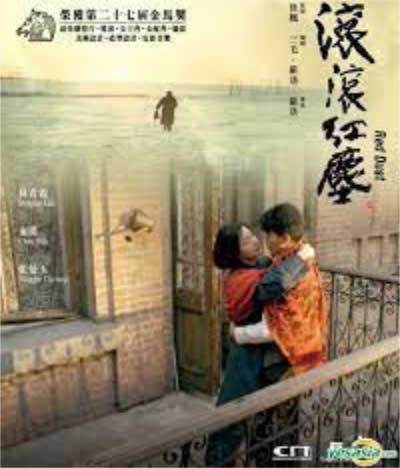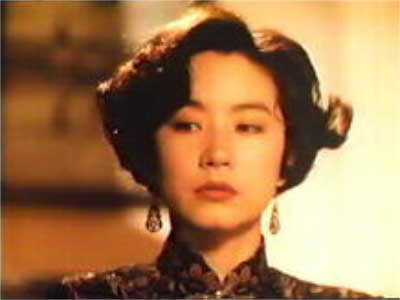Red Dust

Reviewed by YTSL
"May you live in interesting times." So
reputedly goes an infamous ancient Chinese curse. "I wish we
were born ten years later. Ours is an unfortunate generation."
Thus opines a character in the 1990 period piece which its director and co-scriptwriter,
Yim Ho, described as "a very, very emotional film", made not too long after
"the June 4th 1989 crackdown, and so it turned out to be maybe too emotional"
(In Miles Wood's "Cine East", 151:155).
For those who are culturally removed as well as
politically unaffected by the events of Tienanmen Square and others which
took place a half century or so ago in Mainland China and form the movie's
backdrop, RED DUST can come across as an overwrought and somewhat unbelievable
melodrama. The historic film's garnering eight nominations at the Hong
Kong Film Awards and eight awards at the Taipei Golden Horse Film Festival
(Best Picture, Director, Actress for Brigitte Lin Ching-Hsia, Supporting
Actress for Maggie Cheung, Cinematography for Poon Hang-Sang, Artistic Design
for William Chang, Best Costume & Make-up Design, and Original Score)
bears testimony though to its having successfully struck a chord with some
East Asian folk.

At the center of RED DUST is a character who is recognizably based on a Shanghainese
author named Eileen Chang (one of whose works Ann Hui adapted into "Eighteen
Springs"). Giving an extremely fine performance, Brigitte Lin brings
to life this rather tragic as well as eccentric figure: The child of
a loveless marriage, whose father not only remarried but kept her effectively
imprisoned up in the attic while he was alive; a novelist whose works of
ostensible fiction contain details about her own life and person (something
which is recognized by a male suitor who turns out to be married -- though
estranged from his wife -- and, worse, a Japanese collaborator); whose best
friend is not around as much as she would like, in some part because she
has a boyfriend who is a resistance fighter during World War II and anti-government
demonstrator afterwards. Apart from her romantic entanglements, the
trouble they bring and the pain they cause her, the protagonist also has
to contend with at least twice suffering fates that could be said to be worse
than death (in that she was unsuccessful in taking her own life), AND with
living through the tumultuous years that saw parts of China under foreign
occupation and civil unrest as well families along with territories get split
up.

Sometimes, it is the case that fiction can be too uncomfortably close to
reality for some people. Considering when and where the film was made,
the fact of there being two student activists (one of whom is portrayed by
the luminescent Maggie Cheung; the other of whom is played by Yim Ho himself)
being sympathetically depicted in it probably was as politically problematic
as a Japanese collaborator being made out to be less a villainous than pathetic
individual. Indeed, Yim Ho has reported that: "For allowing me
to make RED DUST in China, some of the top officials in the film bureau were
forced to sit down and write a lot of self criticism" (See Fredric Dannen
and Barry Long's "Hong Kong Babylon", 1997:164).

It also has been said that truth can be stranger than fiction. At the
very least, when one considers the lives of certain key members of RED DUST's
cast and their kin, quite a few events and actions depicted in the film become
rather ironic and still more melodramatic. For example, when watching
the chaotic scenes of people desperately trying to leave for Taiwan ahead
of the Communist takeover of China, it is hard not to think of the fact that
the work's lead actress and actor -- Brigitte Lin and Chin Han -- not only
hail from Taiwan but have parents who did flee from the Chinese Mainland
around this time and for this reason (Not only that but Chin's father was
a prominent Nationalist general and Lin's father a military doctor).
On a less political note, it also is difficult to erase from one's mind that
the two who played lovers in RED DUST were a real life couple at the time
that the movie was made (As such, there seems to be a particularly knowing
as well as intimate feel to the pair's romantic scenes).

It might be due to my having a particular bias in favor of RED DUST's main
but also primary supporting actresses. Maybe it is because the key
relationship in a film whose focus is a woman is that between two female
friends. Whatever the reason, I do think that the warmest as well as
most charming scenes in this extremely personal and poignant feeling -- sometimes
excruciatingly so, in fact -- production are those in which Brigitte Lin
shares the screen with Maggie Cheung, and we witness their characters caring
for each other and revelling in each other's company. Frankly, my major
regret about this moving work is: Less that it could not be the epic
that some people have detected that Yim Ho wanted it to be; but more that
there were too few times that this charismatic duo were alone as well as
together.

My rating for the film: 9.5








